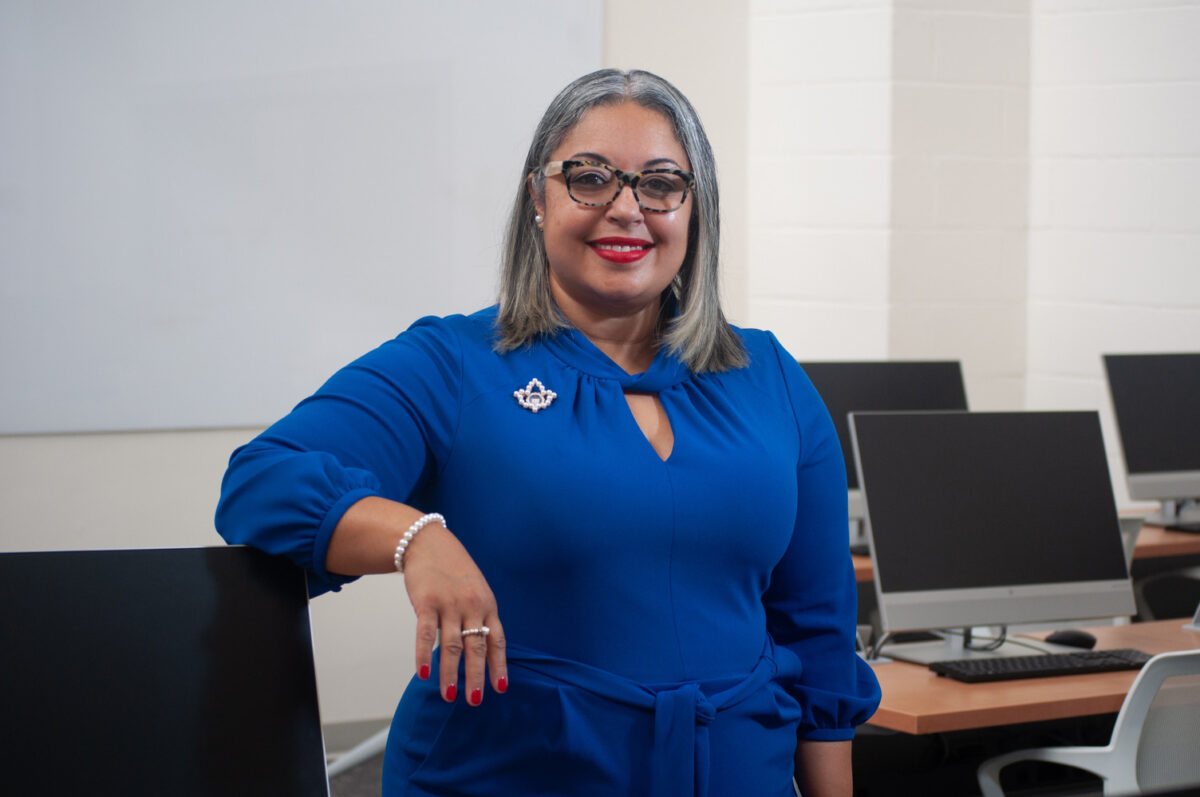In August, the Atlanta-based VC firm that works to close the funding gap by investing in startups owned by Black women was hit with a lawsuit by far right activist Edward Blum — whose American Alliance for Equal Rights (AAER) brought affirmative action to the Supreme Court and succeeded in getting it overturned — on the grounds that investing in Black women specifically is racial discrimination.
No matter that Black women are virtually shut out of VC funding in general: In 2021, Black women received less than one half of one percent of VC investments — 0.34%.
Hazel Geary, cofounder of women creatives-focused network organization Monument Women’s Creative Alliance, received a $10,000 grant from Fearless Fund in 2022.
“The support enabled us to not only dream but to chart a short- and long-term vision for our organization,” Geary said in a guest post for Technical.ly. “Moreover, this fund provided us with the resources needed to reach more women and conduct important market research, which in turn helped us understand what our members wanted and where they wanted us to grow.”
Ultimately, she continued: “Grants like those from the Fearless Fund are so important not only because they offer us a chance to break through barriers.”
Suing the Fearless Fund is just the beginning of Blum’s post-affirmative action lawsuits. AAER is also targeting law firms with fellowships aimed at students of color, students with disabilities and LGBTQ students. (On Tuesday, news broke that a federal judge had denied Blum’s request for an injunction to bar Fearless Fund from making grants to Black women.)
“Grants like those from the Fearless Fund are so important not only because they offer us a chance to break through barriers.”Hazel Geary Momentum Women’s Creative Alliance
Attacks on programs that are intentional about trying to close the gaps created over centuries of systemic inequities by calling them racist is nothing new. They have exploded in the past few years as right-wing culture wars, fueled in large part by racism, have worked to undo any progress made by Black people in the US.
Erin Horne McKinney, the national executive director of the Howard University and PNC National Center for Entrepreneurship, an organization that supports Black entrepreneurship, notes that it’s only been a couple of years since it was socially acceptable for companies to use the word “Black” in their programming. It wasn’t until after the murder of George Floyd that companies became comfortable using the word, instead turning to “soft” terms like BIPOC. Language broadened, she said, and corporate commitments were made specifically to Black students, entrepreneurs and communities.
Crusades like the AAER’s have in the past discouraged resource contributors from specifying that they aim to support Black people specifically, allowing resources to continue to be withheld from Black communities, Horne McKinney said.
This time, after even just a few years of seeing the word Black ensure that resources are not diverted to any other minority but Black people, the Black business ecosystem is standing up to neutralizing terminology.
“When you think about the importance of keeping Black in there, it’s extremely significant, so much so that it impacts policy and federal dollars,” Horne McKinney told Technical.ly. “When you look at how money and resources have been distributed, a lot of those resources never make it to Black people. A lot of things related to diversity and inclusion initiatives are solved with white women or other minorities instead of the Black community, so it’s imperative for us to be very clear about the communities that we serve, because the resources historically, and currently still, are not going to be communities that they are intended for.”
“When you look at how money and resources have been distributed, a lot of those resources never make it to Black people.”Erin Horne McKinney Howard University and PNC National Center for Entrepreneurship
The program Horne McKinney directs is based on a $16.8 million grant from the PNC Bank Foundation to create a national entrepreneurial network across all Historically Black Colleges and Universities (HBCUs) by connecting those institutions. The national center is based at Howard University, and there are three other regional centers at Oregon State in Baltimore, at Clark in Atlanta, and at Texas Southern in Houston, each doing direct ecosystem-building work.
There is a consensus between the people doing this kind of intentional work that backing down is not an option, according to Horne McKinney.
“At the Black Economic Forum conference in August, [everyone] talked about we’re going to rally around and support” Fearless Fund, she said. “There are things that are happening which to me give me a lot of pride that we are uniting around these issues, and that the broader community is coming in supporting them. There are law firms that have stepped up to support not just the Fearless Fund pro bono, but there’s a fund that has been created to help support other organizations and funds that come under attack. I think what is beautiful in this moment is seeing how powerful we are when we unite together and not allow ourselves to be divided.”
The Supreme Court’s affirmative action ruling is expected to increase applications to HBCUs, as Black students seek schools where they can feel safe and supported — which could make the national HBCU entrepreneurship network even more impactful and vital in the fight for racial equity.
“Ultimately what our work is about is allowing people to have their dreams realized,” Horne McKinney said. “People hope that there’s an opportunity to dream, to have better, to do better. We’re in the business of helping dreams come to fruition.”







